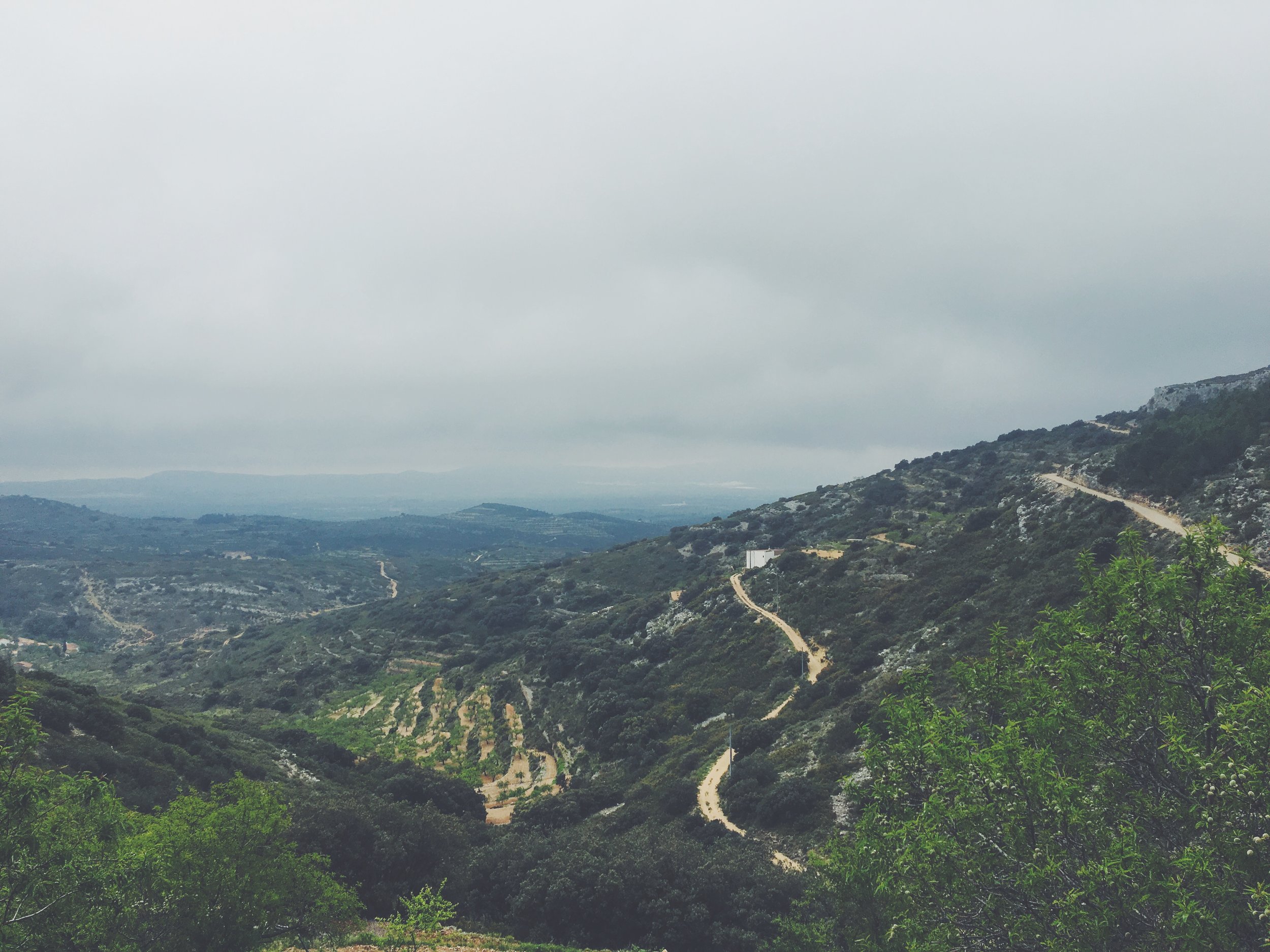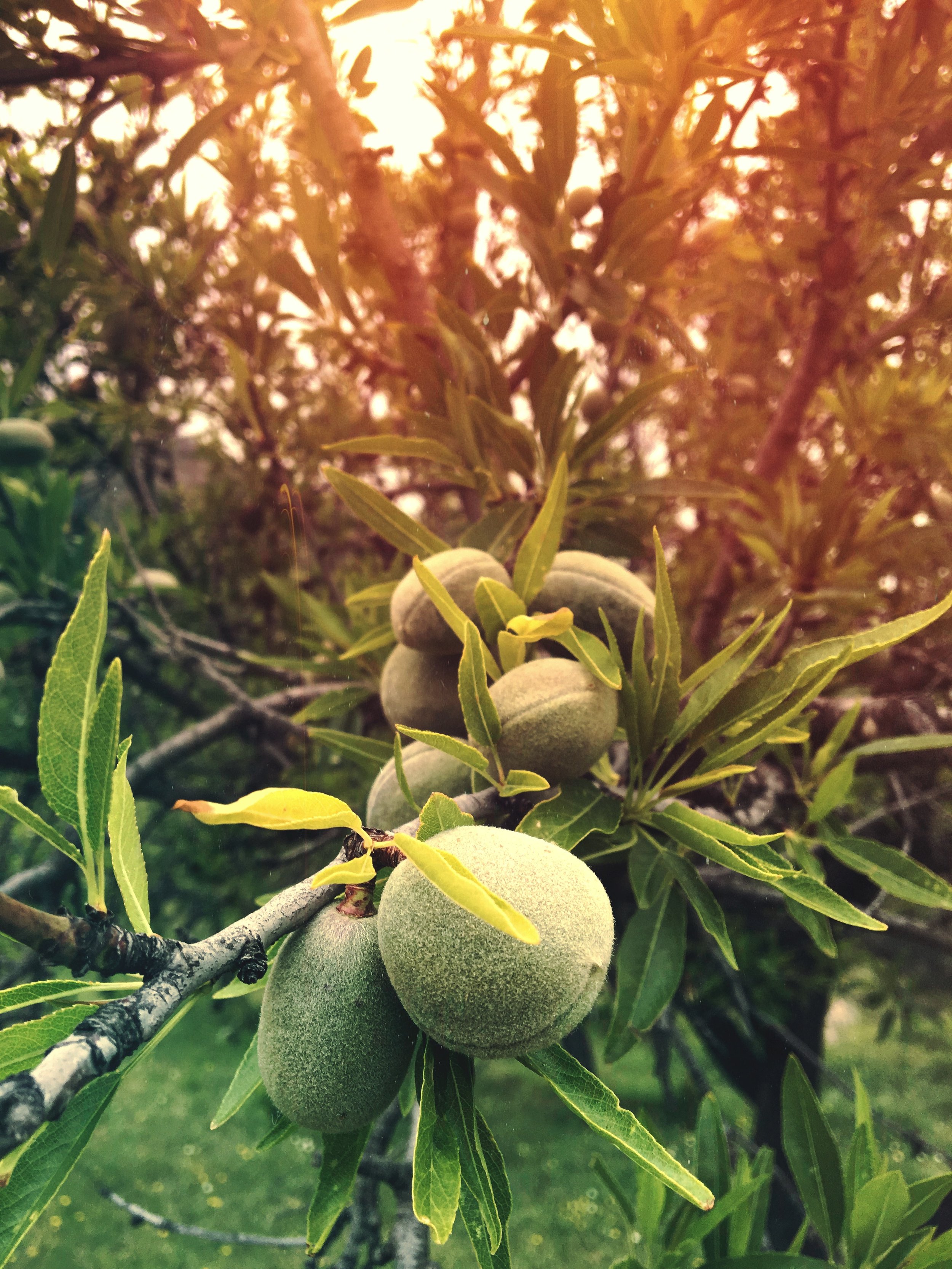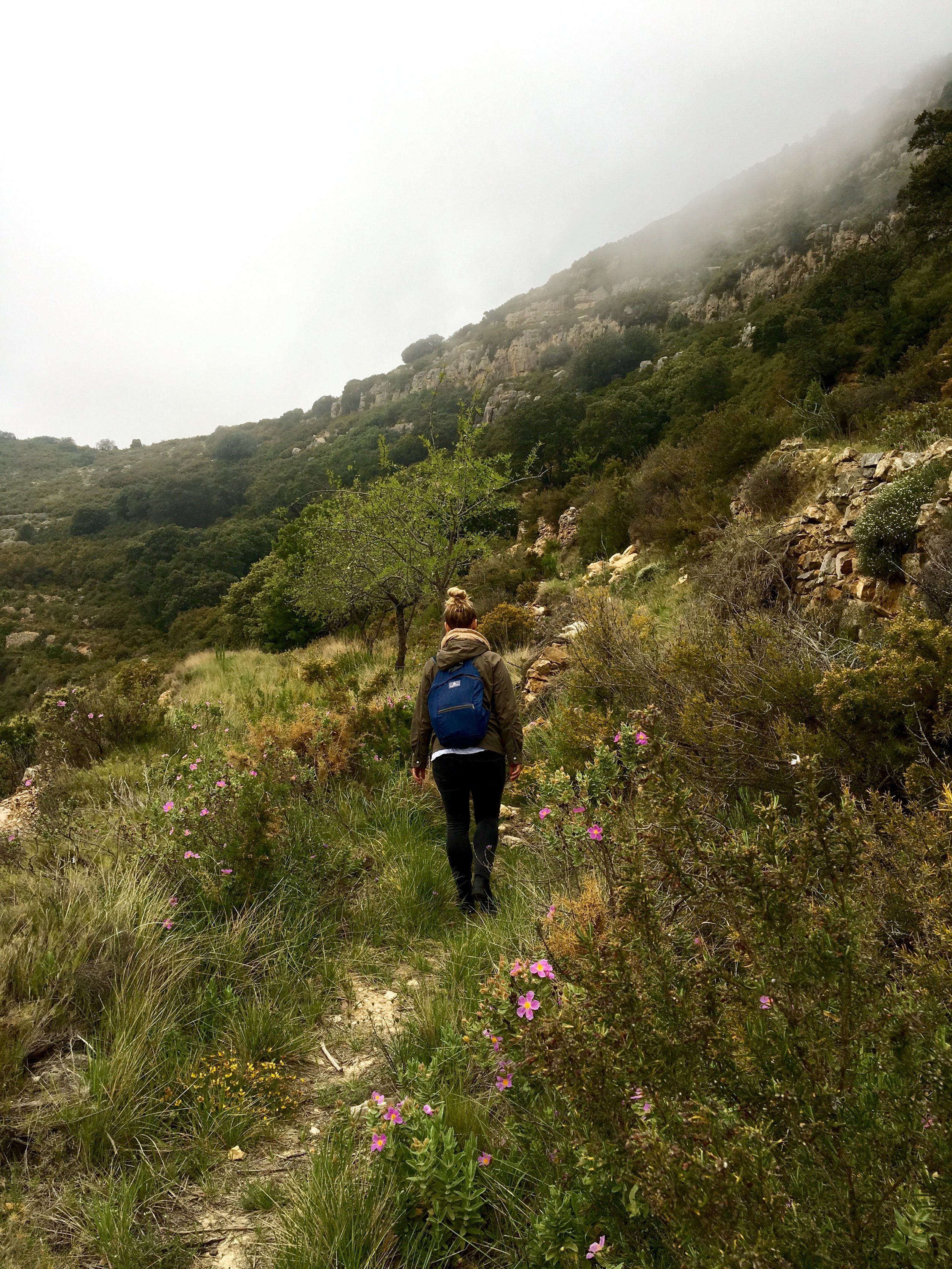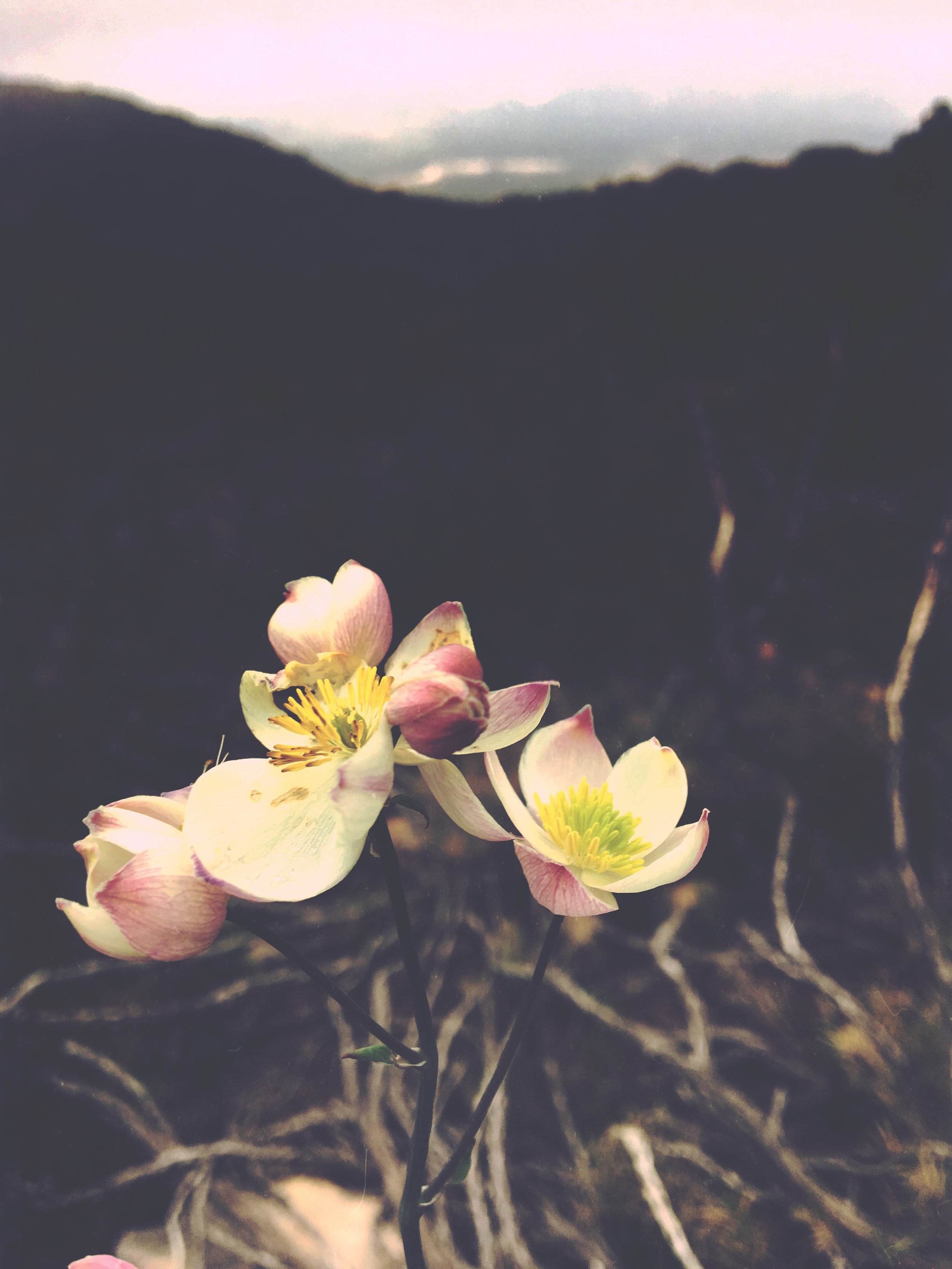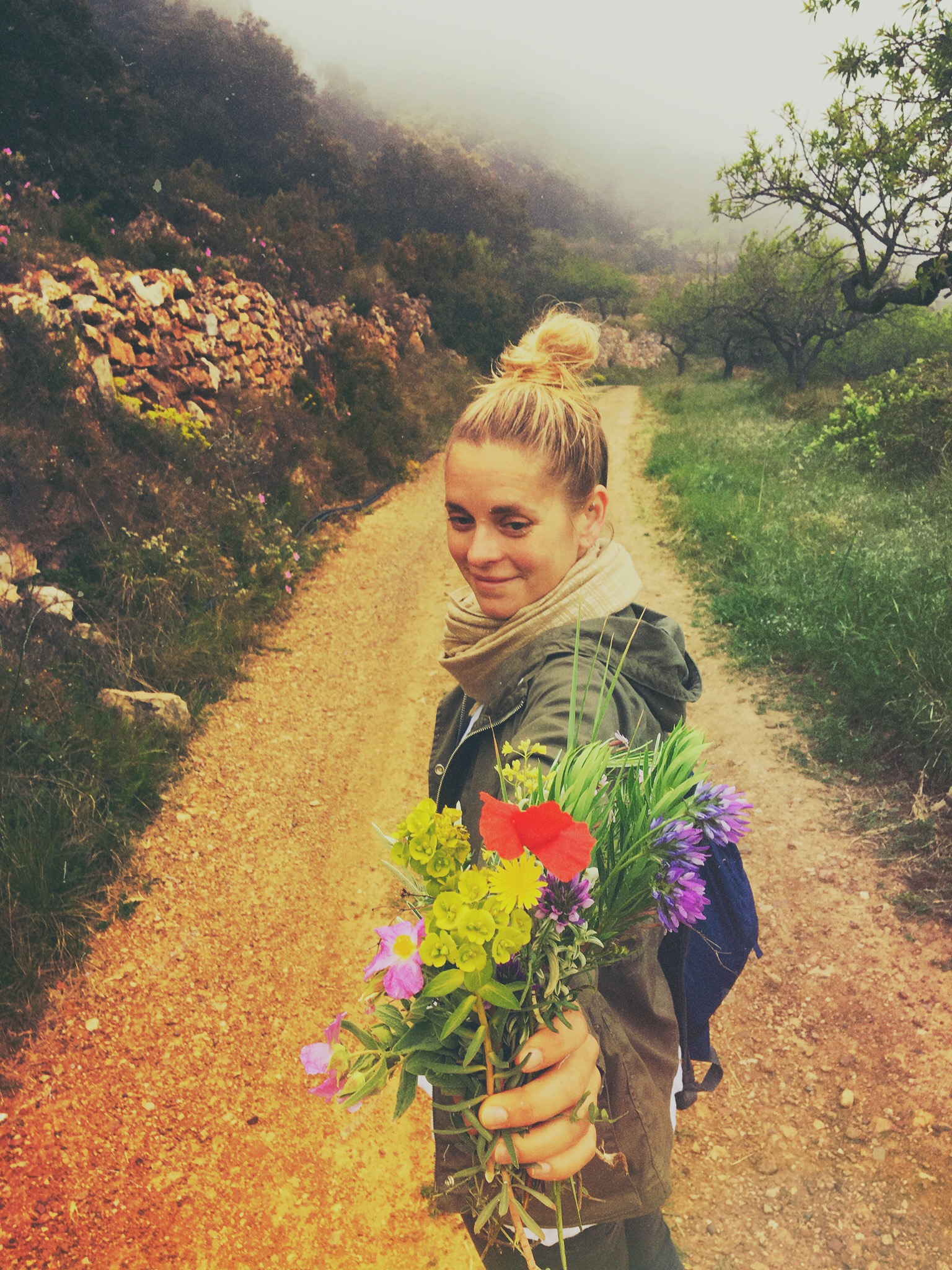SIERRA ENGARCERAN
From Sitges, Jill and I drive south to Valencia. Our destination is the tiny village of Sierra Engarceran in the province of Castellón. We arrive late in the day, our Smart Car rolling through the narrow, shuttered streets like a marble in a maze. Slowly, people begin to appear—an old man with his matted, brown dog, boys unloading a truck, a cluster of women chatting on a side street.
I park in the plaza and phone Rob, our host. He arrives moments later, unfolding himself from a blue Citroen as his dog peers out from the back window. His hands and jeans are dusty with clay as he kisses us gruffly on both cheeks. He is an artist, an almond farmer, a joyful transplant. We follow him on the serpentine road out of town and are rendered speechless by the late afternoon light that folds down across the hills like giant, gold wings.
*
We stand in the stone piazza outside his masia—his farmhouse—and gaze at the craggy peak at its back, the steep incline bursting with herbs.
“Remember, you are in rural Spain," Rob says, in his gentle British lilt, when we ask about Wi-Fi and the nearest amenities. His nonchalant shrug signals that we will be far from pretty much everything for the next week. Life will move at a snail's pace; there will be mist and fog and drizzle and possibly—storms.
Each detail of his property seems plucked from a novel: the tidy terraces of almond trees, green, sunken pool in the garden, the living room’s snug, stone fireplace. In the kitchen, we linger beneath low-slung beams and admire the postcard view of the village framed by a large window. Rob’s dog, Idgie weaves between us excitedly, her black body sleek as a raven’s wing.
Rob begins to list off possible points of interest—we could hike to the saddle of Tossal de l’Om (the mountain behind the masia and the site of a 14th Century Muslim encampment only recently unearthed by archaeologists). Or, we might drive to the nearby towns of Ares and Morella—ancient, walled cities topped by medieval castles. As Rob talks, I fat-finger notes into my phone and finally—after building a fire in the living room and showing us a stash of leftover wine—he departs, Idgie trotting at his heels.
Left to our own devices, we realize that we are in need of supplies. We return to town and following my muddled notes, drive in circles until we finally locate the carnisseria. Entering, we dodge the swish of beaded curtains, and are greeted by Ima, the shop owner. She is aproned and curvaceous with an inquisitive face framed by brown curls. Briskly, she beckons us inside.
“Qué te gustaría?” She asks, feet and hands spread wide. What would you like?
Words leave my mouth in a slow stream and her tiny counter begins to fill: oranges, avocados, bananas, broccoli, apricots, tomatoes, thick slices of ham, cream, mayo, eggs, cheese, a loaf of bread and three bottles of wine—two tinto, one rosa.
As she deftly taps numbers into a calculator, she unleashes a barrage of Spanish. Where are we from? Are we staying at Rob’s masia? Is fair-haired Jill Rob’s daughter? The last question makes us laugh. Aside from the fact that they are both Caucasian, Jill and Rob look nothing alike.
In a flurry, Ima bags our purchases. The entire haul will feed us for a week and costs nineteen euros, wine included. Before we leave, she imparts snippets of local information—the bakery is open from six-thirty to two most days, never on Sundays and on Saturday, hours vary. The farmacia is around the corner and Bar Salvador sells wine, beer, cigarettes and occasionally, food.
“Entiendes?” She looks at me pointedly. Do you understand?
I nod. "Your words come so fast. Como un viento.” Like a wind.
She laughs and with the cadence of an approving mother, tells me that it’s good that I speak Spanish.
“Lo intento,” I reply. I try.
I will always try.
*
Back in the masia’s cozy kitchen, Jill chops piles of vegetables next to a roiling pot—heaps of broccoli, garlic and tomato. She tests the pasta, dumps the vegetables in. Fragrant steam fills the air. Splashes of cream, butter, a pinch of salt. Her elbow lifts and points as she stirs industriously with a wooden spoon. She moves with the grace of a dancer, happier than I have ever seen her.
We draw chairs up to the rough-hewn table and slurp noodles topped with fresh cheese, every so often refilling our squat, clay glasses with wine from a label-less bottle of tinto. A local map is spread out and our eyes rove the topography of Sierra Engarceran. As night shrouds the farmhouse, we become full and sated. Warmly tipsy. The iPhones come out and we play our favorite songs, loud as we please, singing along in the glow of the kitchen.
The next day, we hike. Fog moves in a winged froth, chasing us up the rocky embankment behind the masia. Higher and higher we climb, pink-cheeked, shivering; flanked by hillside troves of hyacinth, thyme, wild lavender and mint. At the pinnacle, Jill buries her face in a feast of purple rosemary while somewhere below, dogs in the valley bark and whine. Seated on a pair of large, flat boulders, we munch sandwiches until a thickening mist sends us down through the shrubs and rock fields. Our steps, careful and precise, as if we are brittle and small and not people at all—but figurines made of glass.
*
We return late to the village one evening, sapped by the desperate, indecisive hunger of strangers in a strange land. Squinting out the car windows, we search for signs of life—a cluster of voices or the furtive glow of lamplight. But darkness has settled over the village like a solemn prayer. All is quiet.
"Bar Salvador?" Jill asks as we slow to a stop near the only place that appears to be open.
We glance at each other and shrug.
Inside, heads swivel as we enter. The dim room is lined with men watching sports, drinking beer, smoking. Murmurs trail us as we walk past.
The proprietor is tall and lanky, somehow younger than we expected in his tracksuit and dark-rimmed glasses. "Bienvenidos," he greets us.
We order wine and I ask if there is food available. He waggles his head for a moment and raises a finger as if to say, I don't usually do this but—
"Mama!" He calls loudly.
A slice of silence and then, the curtain behind the bar ruptures and a woman steps through. Like Ima, she is aproned and rotund with a benevolent face. He speaks to her in a flash of Catalan but the meaning is clear. She nods at us, smiles; disappears behind the rippling cloth.
We pull up chairs at a nearby table and sip our wine. Moments later, the bartender brings us two of the largest baguettes we have ever seen—mighty, hinged planks of crusty, soft bread layered with tomatoes, ham, cheese and olive oil. It is comfort food of the highest order. We devour the simple, savory flavors in rough mouthfuls, scarcely stopping to speak. Or breathe.
Blurry with fullness, we settle our bill, pantomiming our satisfaction with exaggerated gestures.
"Fuen perfecto," I say. "Y gracias a tu mama, tambien!" Thanks to your mother, also.
"De nada, de nada." The bartender dips his head with a smile. "I will tell to her!"
The curtain behind him darts and flutters, but does not open.
FIN
More Photos of Sierra Engarcaren:






